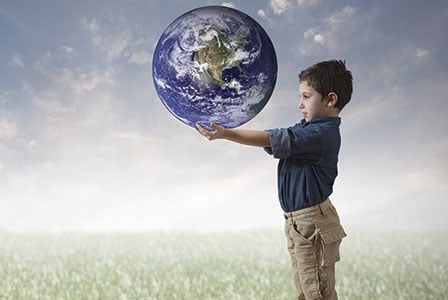
In a scary world, how do we teach our children to be globally conscious? With guidance, they can become aware, compassionate global citizens.
As our world shrinks and news becomes more accessible, our kids have opportunities to learn—and to lead change. We can help them understand environmental, social, and human rights issues around the globe, and recognize their part in providing solutions.
Does global awareness in kids really matter?
It does, if we want our children to inherit an earth they can have some control over, making a positive difference where they see problems.
Plus it’s good for our kids to care. “It creates a better society that is more respectful of people’s rights, and more compassionate,” says Paula Gallo, senior education manager with UNICEF Canada’s Global Classroom program. “But there are also many ways it’s personally beneficial. It makes you feel better; it improves your brain capacity.”
Experts say that children who become involved in their local and global communities have greater self-esteem, enhance their social and psychological development, and make healthier lifestyle choices. They’re also more likely to become engaged citizens as adults.
Here’s how we can connect our kids to the world around them.
Put it on your radar
Raising well-rounded kids shouldn’t stop at hiring a math tutor, sourcing out piano lessons, and signing them up for soccer. But unfortunately, we can’t exactly look in the phone book for classes on compassion and generosity. “Our society isn’t built to create those kinds of opportunities for families,” says Craig Kielburger, co-founder of the international charity Free the Children and the social enterprise Me to We. “Parents and families have to consciously create them, and be as thoughtful about it as they are for academics or sports or music.”
Take on “talkable” moments
When a topic such as global warming or child exploitation comes up in a situation—from a TV commercial to a store sign or a product label—seize the opportunity to chat about it. Why would Auntie Grace like a fair trade gift? How is recycling helpful? Explanations need not be complex or lengthy.
Don’t stay silent
When you don’t address these issues as they come up, you’re still giving your child a message, Gallo points out: “If you walk down the street and see homeless people, and you never say anything about them, you’re saying you’re uncomfortable talking about it, or that it doesn’t bother you.”
Toronto mom Theresa Lemieux wishes she’d dealt with world issues more head-on when her kids, 12-year-old Kate and 14-year-old Benjamin, were younger. “Ben is prone to anxiety, so I worried about it,” she says. “But now I think that being a nervous Nellie myself communicated more anxiety to him. Letting him handle it and ask questions would have inspired confidence in him.”
Be a role model
“Your shopping decisions are big,” says Judy Arnall, a certified family educator and speaker in Calgary. “Money has a powerful influence.” Tell your children why you’re choosing organic fruit. Your kids are also watching you conserve water or hand a granola bar to a homeless teenager. Just watch out! Arnall’s son, now 21, checks whether her coffee is fair trade before he’ll put on a pot. “Once you shape their values, they’ll start nagging you to change your ways!”
Do good as a family
When Kielburger was growing up, his mom and dad performed the same kinds of civic duties that most other parents did—donate used clothes, give cash to needy groups—but the difference was that they pulled their sons in as participants. Together they’d choose which charities to support. “Or we’d go through the closets to get rid of what we didn’t need, but instead of throwing it in the donation bin, our parents would have us carry it into the shelter or mission, where we would actually see the people.”
Find unofficial opportunities
Often, formal volunteer programs have minimum age requirements, so your child may not qualify. Make up for it by organizing volunteer gigs yourself. Your child can help an elderly neighbour rake leaves or become a buddy to a new student. Get inspiration from your kids. “Ask them what they would like to do. Notice what their passions are,” says Arnall. “When they’re young, they don’t have a lot of resources. Having an adult take the time to help them really empowers them to make a difference.”
Think beyond money and time
“A lot of times, when parents think about global citizens, they think of traditional charity,” Kielburger says. “They think, give money or give time. We have a very finite amount of both.” Children can raise awareness through classroom projects or help the environment by riding a bike to school. That doesn’t mean fundraising is totally off the table—your child might get a kick out of operating a lemonade stand or collecting pennies, and these are things even young children can do.
Lay off the guilt
Why should we give back because we feel bad? We should do it because it’s fun and makes us feel great! Some of Kielburger’s catchy campaigns include “scaring” hunger by collecting food donations on Halloween night and using a birthday party to honour children without birth certificates. “I’m not a fan of the idea that charity has to be driven by guilt and be quite depressing. I understand why parents struggle with that type of approach, especially with younger kids,” Kielburger says.
Don’t forget, your children are more likely to stay engaged with a cause that brings them joy. Let them have a blast with a bake sale or car wash.
Empower them
“If my kids say, ‘It’s across the world and there’s nothing I can do about it,’ they’re disempowered,” says Lemieux. She helps her kids pinpoint actions they can take: “If it’s about Canadian politics, for example, the way Ben feels empowered is, ‘I can learn about this and one day I can vote.’” When your children believe it’s possible to change the world, they will grow up hopeful—and ready to roll up their sleeves. “I think most parents want that for their kids,” Lemieux adds. “To pay their bills, and do a few nice things for other people on the way.”
Tips for difficult discussions
Poverty. Disease. Oppression. Earthquakes. These aren’t easy for even adults to take in, so how do we explain difficult news topics to our children? Here are a few tips.
- It may be up to you to raise the topic. It’s natural to want to shield your children from bad news. But don’t assume they haven’t heard anything just because they haven’t mentioned it. As the parent, you can influence how they process it.
- Don’t assume they’ll be depressed or traumatized. Making a topic part of everyday conversation will help to normalize it. Be compassionate and nonjudgmental.
- Adjust what you say according to age. Younger children need to know they’re safe. Explain in simple language why a tsunami happens and what precautions we take so it won’t happen to us. By age 13 or so, kids can appreciate shades of grey—you can discuss, for instance, the consequences of a boycott on an exploited worker.
- Take your cue from your kids. “If your child isn’t ready to talk about it, they’ll let you know, and you can back off,” says UNICEF’s Paula Gallo. “But at least you’re letting them know you’re available to talk.”
